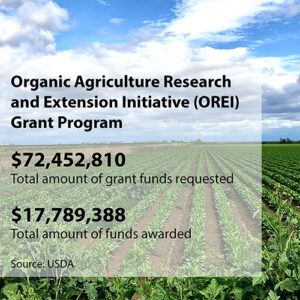OFRF Asks Congress to Increase Funding for Organic Research

By Trevor Findley, OFRF Senior Policy Associate
The OFRF policy team has been hard at work advocating for more federally funded organic agriculture research. Congress is currently in the midst of budget reconciliation, a process that allows them to fast-track legislation related to spending, revenue, the surplus or deficit, and public debt. The current budget resolution calls for $3.5 trillion in spending, and OFRF wants to make sure that organic research receives a share of the increased spending. More specifically, OFRF has asked members of the House and Senate to support an increase in funding for the Organic Agriculture Research and Extension Initiative (OREI). OREI funds research, education, and extension programs that help organic producers and processors to grow and market organic products. Priority areas for the program include biological, physical, and social sciences.
Under existing law, OREI is funded at $25 million in 2022 and $50 million in 2023 and beyond. OFRF has asked for these amounts to be increased to $30 million in 2022 and $75 million in 2023 and beyond. The highly popular grant program currently has a success rate of 26 percent, meaning only about one in four grant requests receives funding. The total amount requested under the program is currently more than four times the amount of money available. By increasing the amount of money that is available, more grants will be funded, increasing the amount of research that will ultimately benefit organic farmers and ranchers.


